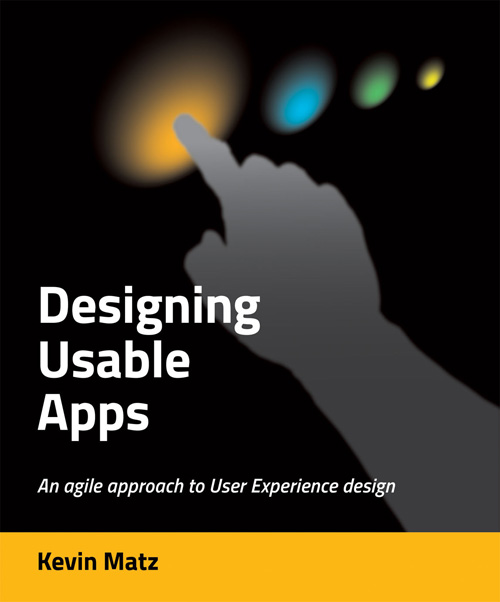My book, Designing Usable Apps, is now available!

- Available in print and Kindle editions at Amazon.com
- Get more information at www.designingusableapps.com
Welcome!
Hi, I'm Kevin Matz. This is my blog about usability and UX design for websites and software products. Let me know what you think!-
Recent Posts
- How to conduct heuristic inspections for evaluating software usability
- Focus groups as a usability evaluation technique
- Analytics as a usability evaluation technique
- Quantifying cognitive load and task efficiency
- The impact of hardware devices on software ergonomics
- Software requirements in a nutshell
- Designing search systems
- Designing an interaction framework for your application’s tasks
- How to build a visual hierarchy to express relationships between page elements
- Interaction design and usability for data persistence and transactions
- Designing navigation and wayfinding in software applications and websites
- Designing your application’s interaction concept
- What characteristics contribute to a negative user experience?
- What characteristics contribute to a positive user experience?
- How to design software to encourage flow states, concentration, focus, and productivity
- Design techniques for reducing cognitive load
- “Don’t make me think!”: Eliminating excise and reducing cognitive load
- Communicating your mental model to the user: Design models and the system image
- Understanding the process of user interface design
- Donald Norman’s design principles for usability
- How do users perform tasks, do work, and learn how to use software applications?
- Understanding the technology framework for building your product’s user interface
- An introduction to data models and UML class diagrams for user interface designers
- Why understanding your application’s domain and data model is a prerequisite for good user interface design
- Requirements gathering techniques for understanding user characteristics
- How to write user personas
- User requirements: Understanding your users’ characteristics
- End users vs. buyers
- User segments and roles
- How to conduct user observation sessions
- How to recruit users for usability testing
- What user interface designers need to know about how human memory works
- How users’ skills and competence improve with practice
- Designing software for different user skill levels
- Security usability: Designing usable software security measures
- Designing error-handling for maximum usability in your application
- How to name things in your application
- Choosing an interaction style for your application
- Don’t make assumptions about your users’ existing skills!
- What is involved in designing user interfaces for an application?
- What is gamification?
- How do users learn and use software applications? An introduction to mental models
- How to use visual attributes to create contrast and attract interest
- Unity: A primary goal in visual design
- Software delivery mechanisms: Comparing desktop applications, web apps, and static websites
- What should you look for in a usability trainer?
- The Gestalt Laws of Perception and how to use them in UI design
- How do people look at and read pages? (Part 3 of 3)
- How do people look at and read pages? (Part 2 of 3)
- How do people look at and read pages? (Part 1 of 3)
- The impact of visual design on usability
- Preview of upcoming topics for this blog
- What is Information Architecture and why is it important in software application design?
- Overcoming objections to involving users in your software project
- What is User Experience (UX)?
- What is User-Centered Design?
- What does “easy-to-use” mean?
- Welcome to Architecting Usability
Categories
- About (2)
- Information Architecture (18)
- Interaction Design (10)
- Office Politics (3)
- Product Management (20)
- Product Marketing (2)
- Project Management (5)
- Psychology for UX Design (23)
- Requirements Engineering (12)
- Training (2)
- Uncategorized (4)
- Usability (38)
- Usability Testing (6)
- User Experience Design (37)
- User-Centered Design (15)
- Visual Design (16)
Archives
- January 2013 (1)
- September 2012 (2)
- August 2012 (2)
- July 2012 (12)
- June 2012 (19)
- May 2012 (5)
- July 2011 (1)
- June 2011 (4)
- May 2011 (12)
Subscribe via RSS
Meta
Category Archives: Psychology for UX Design
How to name things in your application
Humans use language to think and communicate, and when we think and speak about things and concepts in the world, we use names or labels to refer to those things. In other words, names are linguistic handles that refer to … Continue reading
Choosing an interaction style for your application
One of the first things to be decided in creating your application’s interaction concept is to decide on the general interaction style, by which we mean the fundamental way that the application presents itself to the user and allows functionality to … Continue reading
Don’t make assumptions about your users’ existing skills!
As a software designers, it’s easy for us to fall into the trap of assuming that users think and act the same ways we do. As a white-collar software professional, you likely have a college education and perhaps an advanced … Continue reading
What is gamification?
Can software products be designed to motivate users and increase productivity? If you’re running an organization and your staff gets their work done using an enterprise application, you’ll naturally want to increase their productivity. Or, if you’re running a community-driven … Continue reading
How do users learn and use software applications? An introduction to mental models
As your users learn to use your software application, website, or device, they gradually form a mental model of how it works and how to operate it. A mental model is a conceptual representation, in a user’s mind, of how … Continue reading

